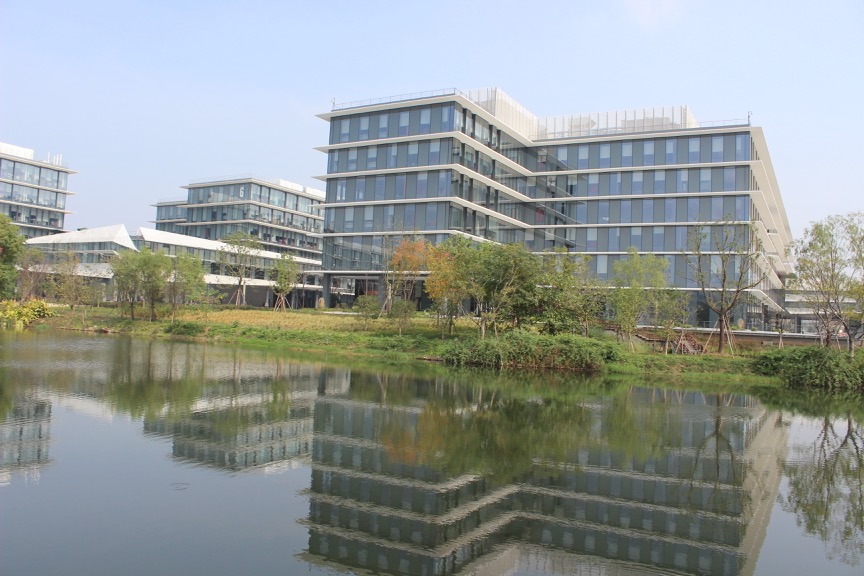Initially launched in 1999 as an online marketplace for Chinese-made products, The Alibaba Group has gone on to become one of the biggest companies in the world with a market cap of over $210 billion.
While online retail remains Alibaba’s core service offering, the firm has expanded into a huge range of activities, including comprehensive cloud services for smart buildings.
In this research note, we examine Alibaba’s cloud-based approach to the smart buildings and cities markets, how it sits in the global cloud market, and what it has done to drive smart building policies in its own large real estate portfolio.
Alibaba’s Smart Buildings & Campus
Alibaba has committed to becoming carbon neutral by 2030, vowing to reduce carbon emissions by 1.5 gigatons. Since 2020, the Hangzhou-based firm has taken significant measures to drive innovative technologies and green approaches across its established campuses and new buildings.
Responsibility for Alibaba’s real estate portfolio falls on the firm’s general services office, which manages campuses in 27 different regions around the world, including over 160 individual sites in more than 100 cities, and serving over 200,000 Alibaba employees.
Alibaba’s headquarters in Hangzhou is a role model for all smart neighborhood developments. The site includes the largest single WELL Gold-certified campus in China, Area B, and the currently under-construction Area C, will soon be the largest LEED and WELL-certified campus in China. The firm has also enacted a policy that ensures all new buildings meet the LEED Gold Standard.
Utilizing its own cloud services, Alibaba launched a smart campus platform, which brings people, spaces and facilities into one digitally connected ecosystem that helps manage offices, facilities, security, and commercial services.
A reported 99% of equipment is connected and integrated through the platform into a central command center using IoT data, advanced algorithms, and AI to control and optimize systems and spaces in line with usage patterns.
AI models synthesize predictions based on historical data with real-time data, including weather conditions and occupancy patterns, to optimize a building’s energy use. In the first six months of operation at Alibaba’s Xixi campus, the AI platform cut energy use by 30% during off-peak hours and lowered air-conditioning energy use during the summer months by 17%.
Alibaba’s main campus has also maintained its natural wetland habit, which has been carefully managed to create a biophilic oasis for the company’s employees. Walking trails, outdoor meeting areas, and small boats are available to support the health, wellbeing, productivity, and collaborative spirit of campus occupants.

Alibaba’s Smart Building Cloud Services
Alibaba’s cloud services platform, Aliyun, offers a suite of cloud services that support the development of smart buildings for a wide range of clients and building types.
Services include IoT and AI capabilities that can be integrated into building management systems (BMS) to create intelligent and responsive environments that drive energy efficiency and the occupant experience.
Alibaba Cloud's IoT platform allows companies to connect and manage a sizable number of IoT devices, collect data, and perform real-time analytics to improve building operations. AI services, including machine learning and data analytics, then enable a range of applications, such as predictive maintenance, energy optimization, and security integration.
Using the platform, facility managers can manage electricity, water, and gas consumption via visualized dashboards with AI-powered functions, such as waste detection, forecasting, optimization, efficiency evaluation, and benchmarking. Aliyun also drives “carbon inclusiveness” with green action guidelines and regulations to promote sustainability behavior.
Alibaba is the leading cloud services provider in China and maintains a dominant position across the rest of Asia with a string of major smart building projects in Japan, South Korea, Malaysia, and Thailand. Furthermore, through its City Brain platform, Alibaba is also rapidly expanding its cloud-based smart city services across the entire continent.
City Brain had been adopted by 22 cities in China by mid-2019 before Kuala Lumpur, Malaysia, became the first non-Chinese city to implement Alibaba cloud to improve its data management. More recently, City Brain has become the choice platform for new and established smart cities in the Middle East, namely in Saudi Arabia and the UAE, including Dubai and Riyadh.
Alibaba’s Smart Building Cloud in Perspective
Cloud service dominated the “infrastructure as a service (IaaS)” category in Gartner’s latest market analysis, which estimated a massive 29.7% increase in 2022, to create a $120.3 billion market for cloud services worldwide. According to the study, Amazon retained the top spot as the biggest IaaS company by revenue with its AWS service, followed by Microsoft, then Alibaba, Google and Huawei.
Bigger than Google, in cloud, Alibaba has actually maintained its place as the world's third largest IaaS provider for five consecutive years. The gap between Alibaba and the top players is significant, however. In 2022, Alibaba Cloud generated revenues of $9.2 billion and commands a 7.7% share of the global market. In the same year, Amazon Cloud generated $48.1 billion in revenue, taking a 40% market share, and Microsoft Cloud received $25 billion in revenue for a 21.5% share.
Fourth quarter 2023 financial data from Synergy Research Group suggest that Google may take third spot in the global cloud market but this does not appear to be an indication of slowing growth at Alibaba.
Alibaba's cloud-based approach to the smart buildings market is comparable to its western cloud counterparts, with some regional differences. Like those firm’s, Alibaba has also shown a clear commitment to the broader smart building ecosystem with cloud, IoT, and AI technologies.
The simple fact that Alibaba is in the same discussion as US tech giants Amazon, Microsoft, and Google on global cloud market share demonstrates their credibility on the world stage. While Alibaba's dominance in some of the fastest growing regions of the world, suggests a long-term trajectory that would keep them in the discussion for the medium-term.



